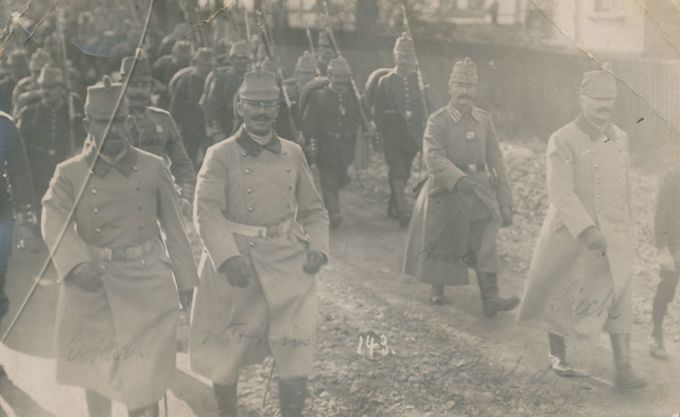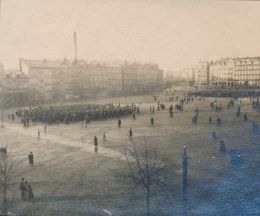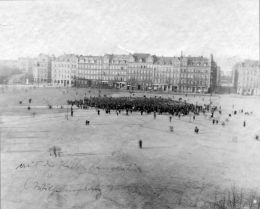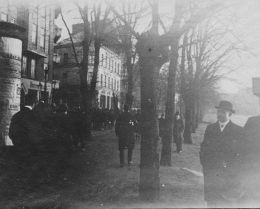Revolution in Kiel/en: Unterschied zwischen den Versionen
(Die Seite wurde neu angelegt: „Otto Eckart was personally involved in one of the most important historic events in 20th century Germany. World War I had virtually come to an end in November…“) |
(Die Seite wurde neu angelegt: „''"On November 3, 1918, mutinous sailors from SMS (His Majesty’s Ship) Markgraf were supposed to be arrested and taken to Fort Stosch. This task had been ass…“) |
||
| Zeile 4: | Zeile 4: | ||
Otto Eckart was personally involved in one of the most important historic events in 20th century Germany. World War I had virtually come to an end in November 1918. The High Command had ordered to cease all combat operations with immediate effect. Nevertheless, the command of the Imperial German Navy planned to attack the superior British Navy so as to sabotage the newly established constitutional monarchy in Germany. The certain death of the 80,000 German sailors involved in this attack was willingly accepted. This resulted in the crews on several ships of the Imperial German Navy having refused to obey orders. Several hundred sailors were arrested and sent back to their home port Kiel. This action provoked unrest and riots, first in Kiel and soon all over Germany. November 3, 1918, is now considered to mark the beginning of the November Revolution in the German Empire. Otto Eckart gives the following account of this day in Kiel: | Otto Eckart was personally involved in one of the most important historic events in 20th century Germany. World War I had virtually come to an end in November 1918. The High Command had ordered to cease all combat operations with immediate effect. Nevertheless, the command of the Imperial German Navy planned to attack the superior British Navy so as to sabotage the newly established constitutional monarchy in Germany. The certain death of the 80,000 German sailors involved in this attack was willingly accepted. This resulted in the crews on several ships of the Imperial German Navy having refused to obey orders. Several hundred sailors were arrested and sent back to their home port Kiel. This action provoked unrest and riots, first in Kiel and soon all over Germany. November 3, 1918, is now considered to mark the beginning of the November Revolution in the German Empire. Otto Eckart gives the following account of this day in Kiel: | ||
'' | ''"On November 3, 1918, mutinous sailors from SMS (His Majesty’s Ship) Markgraf were supposed to be arrested and taken to Fort Stosch. This task had been assigned to the sea battalion, of which only two companies were left, but the crews had already refused to obey the company commanders the previous day. As a result, they fell back upon me, even though I was actually indispensable as the commander’s adjutant. This mission seemed very tricky. During my speech, when I announced the mission and its reasons in the presence of Kiel’s commander, some people grumbled; upon my question, a sailor of the second company stepped forward and declared: ›We do not shoot at our comrades.‹ I had asked the sailors who refused to obey to step out on the left and then had the satisfaction that the whole of my old company, the third, followed my order of ›load and put the safety catch on‹ and went aboard the cargo steamer with me, in order to take charge of the approximately 100 mutinous sailors of the Markgraf. … My wife was informed about my mission and fearfully watched everything through field glasses from Bellevue bridge."''<ref>Eckart Family Archive, Book of recollections from Poing, 1969.</ref> | ||
[[Datei:1915_F03056_Feldpostkarte_Truppe_mit_Otto_Eckart_marschiert.jpg|680px|thumb|none|Otto Eckart, links im Bild, als Offizier auf einer Feldpostkarte von 1915.]] | [[Datei:1915_F03056_Feldpostkarte_Truppe_mit_Otto_Eckart_marschiert.jpg|680px|thumb|none|Otto Eckart, links im Bild, als Offizier auf einer Feldpostkarte von 1915.]] | ||
Version vom 19. August 2021, 20:35 Uhr
Otto Eckart was personally involved in one of the most important historic events in 20th century Germany. World War I had virtually come to an end in November 1918. The High Command had ordered to cease all combat operations with immediate effect. Nevertheless, the command of the Imperial German Navy planned to attack the superior British Navy so as to sabotage the newly established constitutional monarchy in Germany. The certain death of the 80,000 German sailors involved in this attack was willingly accepted. This resulted in the crews on several ships of the Imperial German Navy having refused to obey orders. Several hundred sailors were arrested and sent back to their home port Kiel. This action provoked unrest and riots, first in Kiel and soon all over Germany. November 3, 1918, is now considered to mark the beginning of the November Revolution in the German Empire. Otto Eckart gives the following account of this day in Kiel:
"On November 3, 1918, mutinous sailors from SMS (His Majesty’s Ship) Markgraf were supposed to be arrested and taken to Fort Stosch. This task had been assigned to the sea battalion, of which only two companies were left, but the crews had already refused to obey the company commanders the previous day. As a result, they fell back upon me, even though I was actually indispensable as the commander’s adjutant. This mission seemed very tricky. During my speech, when I announced the mission and its reasons in the presence of Kiel’s commander, some people grumbled; upon my question, a sailor of the second company stepped forward and declared: ›We do not shoot at our comrades.‹ I had asked the sailors who refused to obey to step out on the left and then had the satisfaction that the whole of my old company, the third, followed my order of ›load and put the safety catch on‹ and went aboard the cargo steamer with me, in order to take charge of the approximately 100 mutinous sailors of the Markgraf. … My wife was informed about my mission and fearfully watched everything through field glasses from Bellevue bridge."[1]
Otto Eckarts Fotoalbum
Einzelnachweise
- ↑ Eckart Family Archive, Book of recollections from Poing, 1969.



